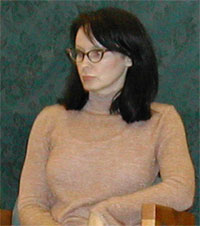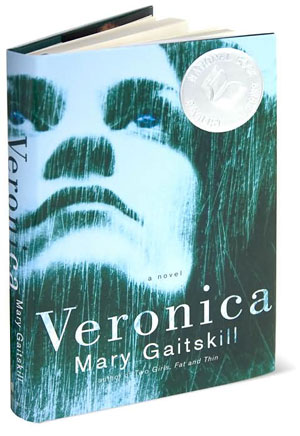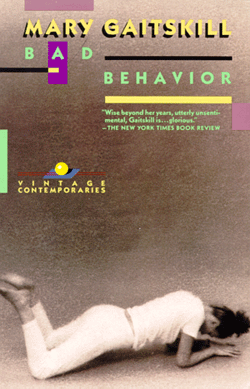NYS WRITERS INSTITUTE
HOME PAGE

 MARY GAITSKILL
MARY GAITSKILL
Her fiction often explores the theme of how people seek intimacy but don't know how to achieve it.
PREVIOUS VISIT:
NYS Writers Institute Reading - October 9, 2001
NYS Writers Institute Reading - April 6, 2006
4:15 p.m. Seminar | Campus Center 375
8:00 p.m. Reading | Recital Hall, PAC
 PROFILE
PROFILE
Mary Gaitskill's new novel "Veronica" (2005), was listed as one of the "10 Best Books of 2005" by the "New York Times" and was a finalist for this year's National Book Award. The novel also appeared on the January 2006 bestseller lists of both the "Los Angeles Times" and the "San Francisco Chronicle."
Set primarily in Paris and Manhattan amid the excess and debauchery of the 1980s art scene, "Veronica" presents the complex friendship between Allison, a former teen runaway, party girl, and fashion model, and Veronica, an eccentric older woman.
"a masterly examination of the relationship between surface and self, culture and fashion, time and memory . . . [Gaitskill's] palpable talent puts her among the most eloquent and perceptive contemporary fiction writers." - "The New York Times Book Review"
"Gaitskill perfectly evokes the ambience of the 1970s and 1980s: the trance of pop music, the ubiquitous drugs, fashion's sadomasochistic bent, the lust for wealth, and the quiet terror of AIDS. And . . . she zeros in on the vagaries of the mind as she considers beauty and disease, betrayal and loyalty, and fear and compassion in a raw-nerves novel that is at once elegiac, funny, and life affirming." - "Booklist" (starred review)
 Gaitskill's fiction frequently explores the meaning of sex in American life. Most often, for Gaitskill's characters, sex represents a desperate and unsuccessful attempt to break out of social isolation. Sexual needs, practices and obsessions also reveal much about each character's defeated hopes, innermost fears, and buried sufferings.
Gaitskill's fiction frequently explores the meaning of sex in American life. Most often, for Gaitskill's characters, sex represents a desperate and unsuccessful attempt to break out of social isolation. Sexual needs, practices and obsessions also reveal much about each character's defeated hopes, innermost fears, and buried sufferings.
Because They Wanted To (1997), which was a finalist for the PEN/Faulkner Award, presents a number of unhappy, unhealthy and emotionally complicated sexual encounters. It is very much a sequel to an earlier story collection, Bad Behavior (1988, Vintage Contemporaries, ISBN 0-679-72327-7), which startled reviewers with its lucid examinations of sadomasochism, drug addiction, prostitution and other self-destructive behaviors.
Gaitskill is the author a novel, Two Girls, Fat and Thin (1991), which explores the odd relationship between its title characters, one sexually reckless and promiscuous, and other socially isolated and abstinent. Though both women are survivors of sexual abuse in childhood, each plays out the consequences of that trauma in a radically different way.
 Gaitskill's short story "The Secretary," provided the basis for the 2002 film starring Maggie Gyllenhaal and James Spader. The film received the Special Jury Prize, and was nominated for the Grand Jury Prize at the Sundance Film Festival.
Gaitskill's short story "The Secretary," provided the basis for the 2002 film starring Maggie Gyllenhaal and James Spader. The film received the Special Jury Prize, and was nominated for the Grand Jury Prize at the Sundance Film Festival.
Mary Gaitskill was born in 1954 in Lexington, Kentucky, the daughter of a teacher and a social worker. She had what she describes as a difficult adolescence, running away from home at sixteen to become a stripper. In 1981 Gaitskill graduated from the University of Michigan, where she won an award for her collection of short fiction The Woman Who Knew Judo and Other Stories.
"[the novel] offers a potent picture of an America promoted by advertising--a place where physical looks, good or bad, are paramount, where adolescent hell is a life's central episode and one that lasts much longer than high school, but where, if luck holds, strength can be drawn from facing up to, and seeking to understand, early experiences of cruelty and fear." - Jane Smiley in Tribune Books
". . .her unflinching flirtation with taboo, her clear-eyed use of seamy detail and her talent in portraying sometimes-creepy people as vulnerable and endearing." - Valerie Miner of Tribune Books
"Sentence by sentence, Mary Gaitskill charts the twists and turns of emotion and desire, in fanatically analytical prose that zips along in a fever of self-consciousness that would seem loony if her observations weren't so sane. . .A lot of these stories are just about perfect." - Craig Seligman in The New York Times Book Review
For additional information, contact the Writers Institute at 518-442-5620
or online at https://www.albany.edu/writers-inst.